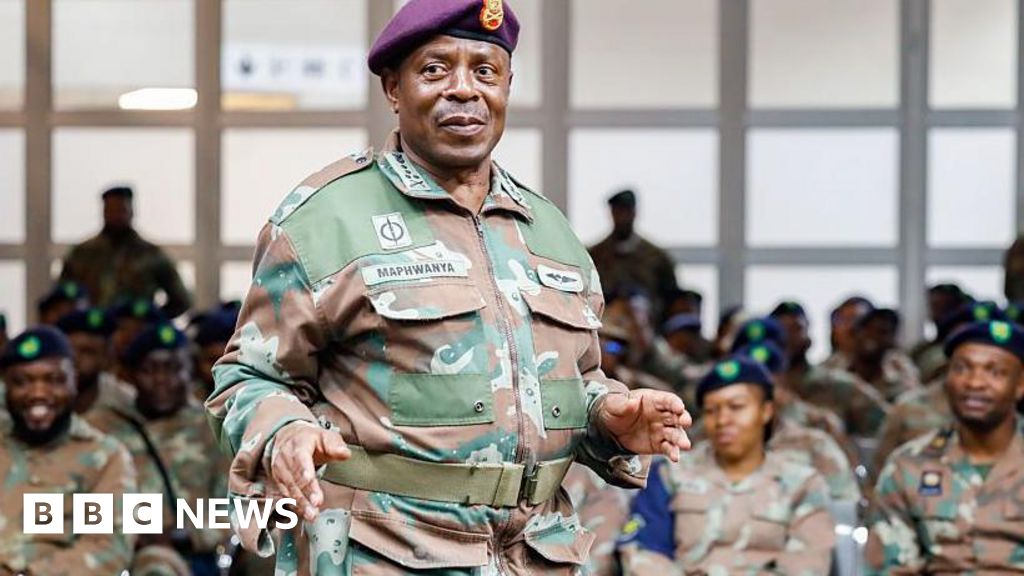South Africa row over army chief's pro-Iran comments

South Africa Army Chief's Pro-Iran Comments Spark Diplomatic Row
South Africa's army chief, General Rudzani Maphwanya, is facing criticism after reportedly pledging military and political support to Iran during a recent visit. The comments have triggered a political storm within South Africa and raised concerns about the country's foreign policy alignment, particularly its relationship with the United States.
President Cyril Ramaphosa has confirmed he will meet with Gen Maphwanya to discuss the "ill-advised" trip. The controversy stems from Gen Maphwanya's statements, reported by Iranian media, indicating a shared purpose between South Africa and Iran in standing "alongside the oppressed and defenseless people of the world." He also voiced support for Palestinians amidst the ongoing conflict in Gaza, further complicating the situation.
Coalition Partners Express Outrage
Members of South Africa's governing coalition have condemned Gen Maphwanya's remarks as "reckless grandstanding." The Democratic Alliance (DA), a key partner in the coalition government, has gone as far as calling for him to be court-martialled, arguing that his statements "went beyond military-to-military discussions and entered the realm of foreign policy," a domain outside his purview.
The South African government has attempted to distance itself from the general's pronouncements. The Department of Defence described the comments as "unfortunate," while the Department of International Relations and Cooperation (DIRCO) stated they "do not represent the government's official foreign policy stance." President Ramaphosa's spokesperson, Vincent Magwenya, confirmed that the president was unaware of and did not sanction the trip.
Historical Ties and Current Tensions
South Africa's relationship with Iran dates back to 1995, with the establishment of a joint commission of cooperation. This relationship, however, has been a source of friction with the United States, especially during the Trump administration.
Dr. Liesl Louw-Vaudran, a senior researcher at the Institute for Security Studies (ISS) in Pretoria, notes that South Africa's historical ties with Iran are rooted in the anti-apartheid struggle. "During the apartheid era, Iran was one of the few countries that maintained relations with the African National Congress (ANC)," she explains. "This historical solidarity continues to influence South Africa's foreign policy considerations."
However, Dr. Louw-Vaudran also emphasizes the complexities of navigating this relationship in the current geopolitical climate. "South Africa needs to carefully balance its historical commitments with the need to maintain positive relations with key partners like the United States," she adds. "The army chief's comments have certainly made that balancing act more difficult."
US Relations Under Scrutiny
The current controversy comes at a sensitive time, as South Africa seeks to navigate increasingly tense relations with the US. Former US President Donald Trump had previously criticized South Africa for "reinvigorating" relations with Iran. He also made unfounded allegations of persecution against white South Africans and condemned the country's decision to bring a genocide case against Israel at the International Court of Justice (ICJ).
While the Biden administration has adopted a less confrontational approach, concerns remain within the US government about South Africa's alignment with countries perceived as adversaries. Gen Maphwanya's comments are likely to exacerbate these concerns and could potentially impact future diplomatic and economic relations between the two countries.
Implications for South Africa's Foreign Policy
The incident highlights the challenges South Africa faces in articulating and implementing a consistent foreign policy. While the government has attempted to downplay the significance of Gen Maphwanya's remarks, the controversy underscores the need for greater coordination and clarity within the country's foreign policy apparatus.
Professor John Stremlau, a visiting professor of international relations at the University of Witwatersrand, argues that the incident reveals a deeper issue within South Africa's decision-making processes. "This episode suggests a lack of clear communication and coordination between the military and the civilian leadership on matters of foreign policy," he says. "It underscores the need for stronger oversight and a more coherent approach to international relations."
As President Ramaphosa prepares to meet with Gen Maphwanya, the focus will be on how the government intends to address the fallout from this incident and reassure both domestic and international partners about the direction of South Africa's foreign policy.
Originally sourced from: BBC News Africa
